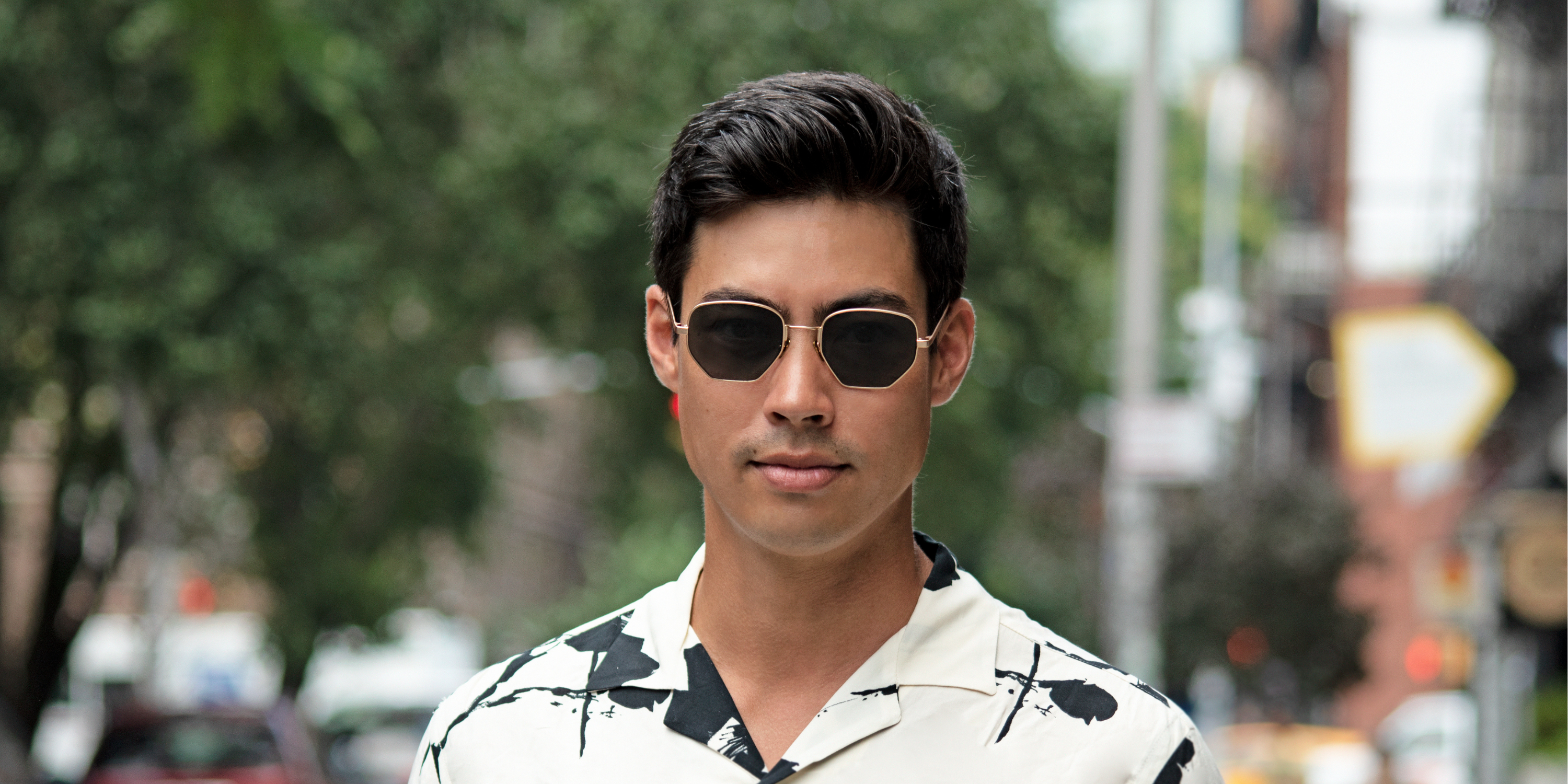
How to Tell if Sunglasses Are Polarized
Curious about polarized sunglasses and whether they're right for you? In this post, we break down what polarized lenses are, how they work, and the key benefits they offer—like reduced glare, sharper vision, and improved eye comfort. We also cover common questions, such as how polarized lenses affect screen visibility and whether everyone needs them. Whether you're shopping for new shades or just want to protect your eyes better, this guide helps you make an informed choice.
There are a lot of questions around polarized lenses, making purchasing decisions and care unclear. Are they for fishermen, are they for post-cataract surgery, or are they for those in lots of snow and glare?
Truly, anyone who is serious about protecting their eyes from UV rays and visual strain should consider polarized lenses. But how do you know if your lenses are actually polarized? What do polarized lenses really do? And are they right for you?
Vint & York is here to answer your polarized questions, so you can shop smarter and see clearer.
TABLE OF CONTENTS
Looking to reduce glare and improve visual clarity? You can add polarized lenses to any of our sunglasses — no matter the frame style. From oversized cat eye sunglasses to modern square frames, our customizable polarized lens upgrade gives you sharper contrast, true color perception, and added protection from reflective surfaces. Whether you're driving, spending time outdoors, or simply want the best lens quality available, our polarized sunglasses deliver style and substance. Read on to learn how polarized lenses work, who benefits most, and why they might be the perfect upgrade for your next pair.
How Can You Tell If Sunglasses Are Polarized?
You don’t have to take your sunglasses to the water to tell if they are polarized. There is a really simple phone test. Open a white screen, like Notes, or a blank webpage. Put on the glasses and hold the phone in front of you, then rotate the phone 90 degrees and if the screen darkens or changes color, your glasses are polarized.
Another test is taking another pair of polarized lenses, holding one lens in front of the other, and rotating 90 degrees. If the resulting overlapping area is entirely dark, both lenses are polarized.
Of course, you can also try them by a body of water, and see if you can see beneath the surface, but it may not be convenient.
Bold, refined, and effortlessly cool — the Baker polarized sunglasses are a modern classic with vintage roots. Featuring a timeless square silhouette, premium acetate construction, and high-quality polarized lenses, these shades deliver standout style with superior glare reduction and UV protection. Whether you're driving, traveling, or soaking up sun on the street, the Baker frames offer elevated everyday performance. Available in a range of versatile colors to suit any wardrobe.
What Are Polarized Lenses?
Polarized lenses are treated with a chemical film that filters horizontal light waves, reduces glare and improves clarity and contrast, especially in bright sunlight and were invented in 1936 by Edwin H. Land, the founder of the Polaroid Corporation.
Land developed a synthetic polarizing filter, now a film, from microscopic crystals aligned in a plastic sheet, which he used to create the first polarized sunglasses. Initially, pilots and drivers used them, but they quickly became popular in sporting communities because they also block horizontal light reflections from water and flat surfaces.
Benefits of Polarized Lenses:
Reduce glare from reflective surfaces like water, snow, and roads
Improve visual clarity and contrast in bright conditions
Ease eye strain and fatigue during extended outdoor use
Enhance color perception and definition
Offer a more comfortable and relaxed visual experience
Do Polarized Sunglasses Block UV Rays?
All polarized lenses are created equally, and some do not block out harmful UV rays. Be sure when you are shopping for polarized glasses that they are labeled “100% UV Protection”, or “UV400”. At Vint & York, our polarized sunglasses have complete UV protection and scratch-resistant coatings.
What’s the Difference Between Regular Tinted Sunglasses and Polarized Sunglasses?
Tinted sunglasses reduce brightness, but they do not eliminate glare. Polarized filters block reflected light, improving contrast and visual clarity, which is particularly helpful when the eyes adjust to clearer vision after cataract surgery or other ocular interventions that cause light sensitivity.
Are Polarized Sunglasses Better for Driving?
Polarized lenses reduce glare by blocking horizontal light reflections, and they reduce glare from other car hoods, asphalt, and other vehicles, giving drivers greater visibility. If you spend a good deal of time commuting or are on the road frequently as part of your occupation, you should consider the benefits of polarized lenses. It is important to note that certain LCDs, including digital dashboards and GPS screens, may be distorted with polarized lenses, so test them before committing.
Can You Wear Polarized Sunglasses While Using a Smartphone or Laptop?
Liquid Crystal Displays, or LCD screens, use polarized light to control the visibility of images and colors. They have polarizing filters at perpendicular angles, with a layer of liquid crystals between them. Unpolarized light enters a screen, the first filter polarizes it, and the second rotates it (like the 90-degree test in the question above) to match the orientation of the second polarizing filter. Because smartphones and many laptops use polarized light, it can distort the images and visuals when wearing polarized glasses.
Devices That May Be Affected by Polarized Lenses:
Smartphones and tablets
Car dashboards with digital screens
GPS and navigation systems
ATMs and card readers
Laptops with LCD displays
Tip: If you notice distortion or darkened screens, test your glasses with key devices before regular use.
Should All Glasses Be Polarized?
If you are frequently outside and exposed to UV light, or in situations where you face a lot of glare, opticians and ophthalmologists recommend polarized lenses to reduce glare and decrease eye strain. As a bonus, they make colors appear richer and sharper.
When to Choose Polarized Lenses:
You spend time near water, snow, or flat reflective surfaces
You drive frequently, especially during sunrise/sunset
You’ve recently had cataract or other eye surgeries
You’re sensitive to light or experience frequent eye strain
You want enhanced clarity and sharper vision in the sun
Do Polarized Sunglasses Look Different from Regular Ones?
Unlike years ago when post-cataract sunglasses had one shape, or when pilots only wore aviators, the polarization technology is just a lens, not a style. Lenses come in many styles, from retro acetate to modern aviators and cat eyes. It is not an either-or situation in polarized sunglasses; performance and aesthetics can go hand in hand.
Do I Need Polarized Sunglasses After Cataract Surgery?
Polarized sunglasses are practically a necessity following cataract surgery. While eyes adjust to clearer vision, glare is particularly common amongst post-surgery patients. Eyes are more sensitive to light after surgery, and high-quality polarized lenses ease this transition and protect your eyes from UV rays.
Interested in Taking the Polarized Plunge?
Shop stylish, polarized sunglasses that are essential to protecting your eyes, enhancing your vision, and elevating your style. We offer polarized lenses in various models, delivering form, function, and retro flair.
What are polarized sunglasses?
Polarized sunglasses have a special chemical filter that blocks horizontal light waves. This reduces glare from reflective surfaces like water, roads, and snow, making your vision sharper, more comfortable, and better defined.
How can I tell if my sunglasses are polarized?
A quick way is to open a white screen on your phone (like Notes), put on your sunglasses, and rotate the phone 90 degrees. If the screen darkens or changes color, your lenses are polarized. You can also test them by overlapping two polarized lenses—if the area between them turns completely black when rotated, they’re both polarized.
Can I add polarized lenses to any Vint & York sunglasses?
Yes! You can upgrade any of our sunglasses to include polarized lenses, no matter the frame style. Choose your favorite design, then select the polarized option during checkout for added clarity, comfort, and UV protection.
Do polarized sunglasses protect against UV rays?
Not all polarized sunglasses block UV rays — but Vint & York polarized lenses do. All our polarized options offer 100% UV protection , shielding your eyes from harmful UVA and UVB rays while reducing glare and eye strain.
What’s the difference between regular tinted and polarized lenses?
Regular tinted lenses only reduce brightness, while polarized lenses eliminate glare and improve contrast, clarity, and color perception — especially in bright, reflective environments.
Are polarized sunglasses good for driving?
Yes — polarized sunglasses are great for driving. They reduce glare from roads, windshields, and other vehicles, helping you see more clearly and comfortably. However, some digital dashboard displays or GPS screens may appear distorted, so it’s smart to test before committing.
Do polarized lenses affect smartphone or laptop screens?
They can. Polarized lenses may distort images on LCD screens , including smartphones, laptops, and car displays. This is because these devices already use polarized light. If screen visibility is crucial, test your sunglasses with your devices before daily use.
Do I need polarized sunglasses after cataract surgery?
Yes — polarized lenses are often recommended after cataract surgery. They help reduce sensitivity to light, ease glare, and improve visual comfort while your eyes adjust to clearer vision.
Who benefits most from polarized sunglasses?
Polarized lenses are ideal for:
Drivers
Outdoor enthusiasts
Post-surgery patients
Anyone sensitive to glare or bright sunlight
People who want a clearer, more relaxed visual experience
















Leave a comment
This site is protected by hCaptcha and the hCaptcha Privacy Policy and Terms of Service apply.